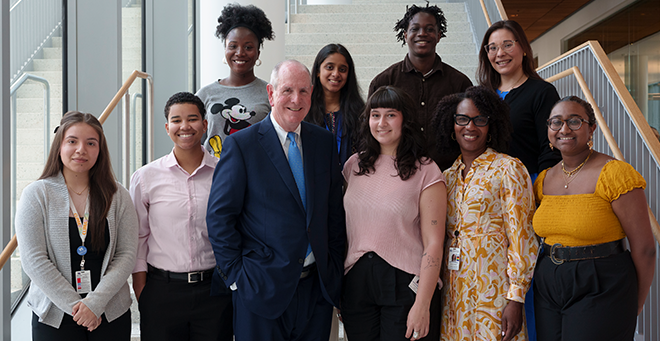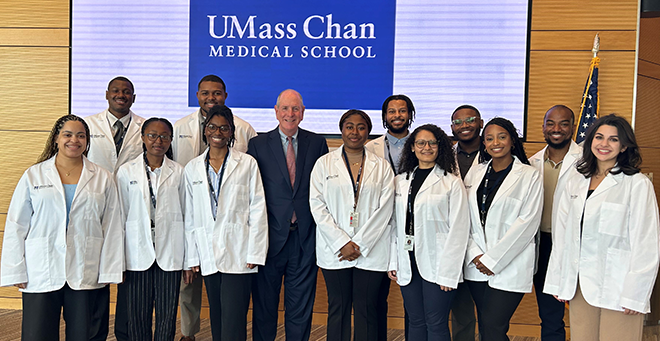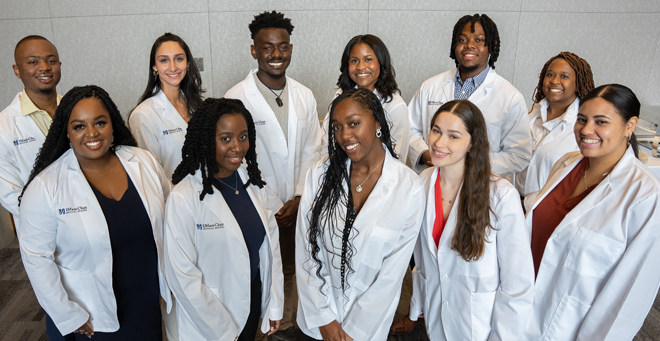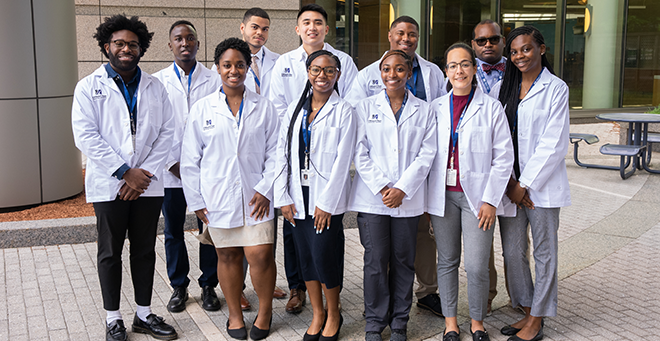
2024 Emerging Professionals Summer Internship Program participants with Marlina Duncan, EdD, vice chancellor for diversity and inclusion, and Lynn Hernández, PhD, assistant vice chancellor for diversity and inclusion.
Internships run by the Diversity and Inclusion Office at UMass Chan Medical School are proving that the programs benefit both the interns and UMass Chan, while reflecting a commitment to diversity, equity and inclusion.
A paid, 10-week program, the Emerging Professionals Summer Internship Program exposes students from backgrounds underrepresented in science, technology, engineering and math (STEM), and health sciences to an array of career opportunities.
“The internship gives us an opportunity to get in some hours to help us on projects,” said John Erwin, vice chancellor for government relations, whose department employs an intern each summer. Erwin said they identify one big project for the intern to work on, but also involve them in the day-to-day activities so they get an idea of the rhythm of the workplace.
“One benefit I find the internship provides for us, in addition to getting work done, is that when explaining our processes out loud, interns ask questions and make suggestions on better ways to get things done or call on us to evaluate why things have always been done a certain way,” Erwin said.
“It’s a really fun program because we see the students absorb as much as they can and they bring a kind of a fresh perspective to us as well,” said Valerie Wedge, LICSW, CEAP, director of the Office of Well Being, whose department also employs a summer intern.
Both Erwin and Wedge shared that a major success and impact of the program is that students remain in touch for mentorship and professional advice even after their term concludes.
“Many people pass UMass Chan, and they have no idea what goes on there or they think you need to be a super scientist to work here. The program provides us with a potential pipeline where students can go back to their peers and share about the career possibilities here,” Erwin said.
For students further along the path of studying medicine (rising second-year medical students), the Summer Learning Opportunity program offers exposure to clinical rotations and research experience in a specific specialty area for four weeks.

Medical students in the 2024 Summer Learning Opportunity cohort with Chancellor Michael F. Collins.
“When you look at the practice of obstetrics and gynecology across the country, there are not enough clinicians from backgrounds historically marginalized by racism and are underrepresented in medicine and science,” said Tiffany Moore Simas MD’00, MPH, MEd, the Donna M. and Robert J. Manning Chair in Obstetrics and Gynecology, chair and professor of obstetrics & gynecology, and professor of pediatrics, psychiatry and population & quantitative health sciences.
Dr. Moore Simas said she believes the national maternal mortality and morbidity rate must be addressed—the United States has the highest maternal mortality rate in the developed world and Black women are disproportionately affected. Supporting the program means making sure that clinicians who are caring for patients can see themselves in each other and build a bond of trust where mistrust has festered for centuries, she said.
“For patients to see physicians that look like the community we live in is especially important in pediatrics because that is where the future lies,” said Nisha Fahey, DO, MSc’21, assistant professor of pediatrics. Dr. Fahey believes that education and intervention as early as high school are major components in increasing representation in medicine.
“We gain a lot out of this program too. The students bring an incredible richness to the learning environment with new perspectives based on lived experience and geography as well as their passion and interest in being immersed in the pediatric space,” Fahey said, as she hailed the program for the bilateral enrichment experience.
Fahey and Moore Simas celebrate the longitudinal relationships their departments have had with former interns. For example, the Department of Obstetrics & Gynecology continues to work with former interns on research projects that have been submitted and accepted to the American College of Gynecology.
They also believe that the exploratory nature of the program is a major strength as students get to either solidify their interest in a specialty or decide on a different path.
“We really hope this opportunity helps the students to find their people, find their place, find what is their passion in medicine,” said Fahey.

